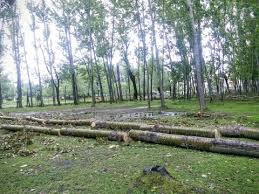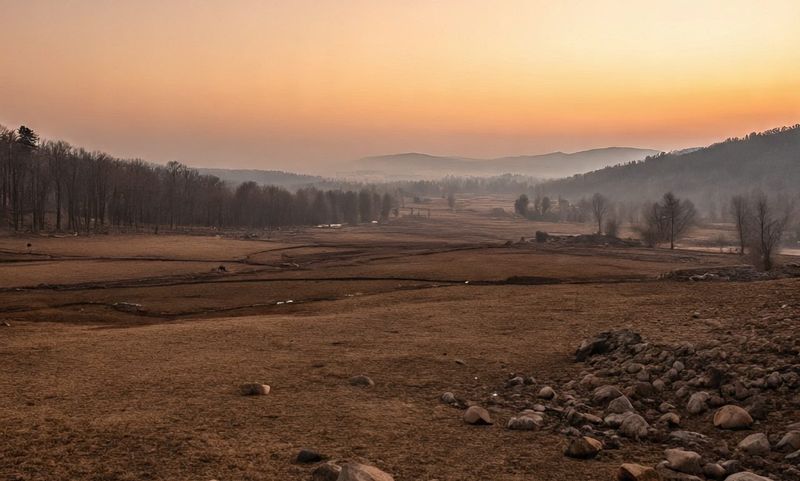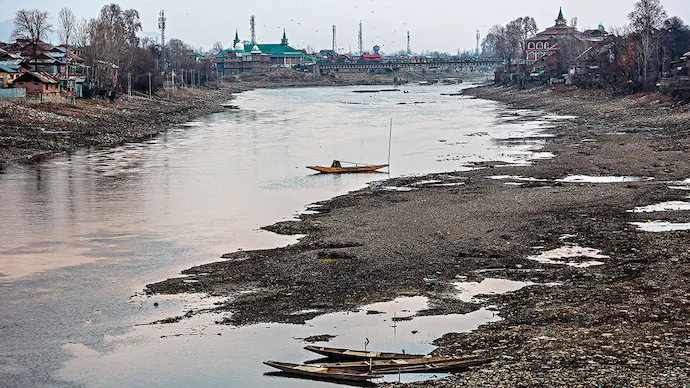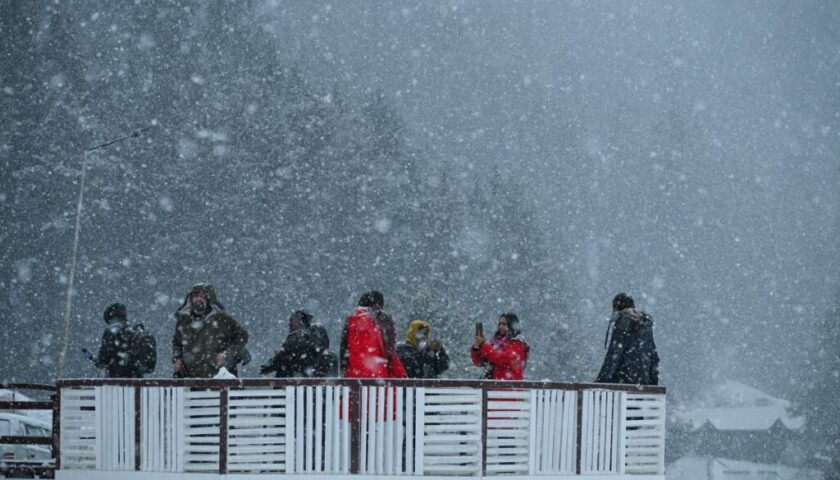As they recall the dark period when the renegade outfit was operational, these villagers along with experts, wonder if cases against Ikhwanis for plundering of forests in Kashmir should be reopened…
 A man of good repute and influence in Sumbal, Sonawari and Hajin hamlets of North Kashmir some 20 years back, Nambardar Ghulam Mohi-ud-din Dar vividly remembers unfolding of a dark era that has gone down in history of valley as a dreaded chapter for many of his fellow villagers.
A man of good repute and influence in Sumbal, Sonawari and Hajin hamlets of North Kashmir some 20 years back, Nambardar Ghulam Mohi-ud-din Dar vividly remembers unfolding of a dark era that has gone down in history of valley as a dreaded chapter for many of his fellow villagers.
Son of former Nambardar and Sarpanch, the sexagenarian man still remains one of the most respected and influential persons in his native village yet he pleads helplessness. A regretful father, Dar says that it was partly because of the position he enjoyed in the villages by virtue of inheritance that his four sons could not complete their education. “My sons were afraid to go out and they left their studies due to fear,” he confides.
When mayhem had broken loose…
Hailing from a family of landowners, the Nambardar was well-aware of the land records and forest areas which, according to him, made him a potential asset for the newly formed Ikhwan, a renegade group that came into being in the 90s.
For more than four years, between 1992 to 1996, Dar lived like a fugitive, away from his home and his family in Chrengpora village of Preng for he was being hunted by the ‘commanders’ of this group based in and around Dar’s modest village situated on the banks of River Jhelum. “They wanted me to be a part of their outfit but I denied which antagonised them against me,” he states.
Spearheaded by the likes of Kuka Parray, who was one of the founding members of the militia and based in the same vicinity, Ikhwan had begun a massive crackdown in the 90s on militants and their sympathisers. During this time span, however, mayhem had broken loose, and incidents of widespread plundering of forests, looting of hamlets, and harassment of villagers were also reported. Prominent award winning human rights activist Parvez Imroz agrees saying, “The human rights violations in the 90s were gross.”
In Hajin and Preng, another hamlet in North Kashmir, villagers accuse the Ikhwan for forcing them to sell their land after the group extorted money from most of them, irrespective of the financial background. “Those were terrible days. We had to sell whatever we had to meet the demands of Ikhwan, a state supported outfit,” a villager from Hajin, Ghulam Mohammad describes.
‘Ikhwan ruled the area with no accountability’
Revisiting the horror, Dar remembers that when he was hiding in Sopore, his brother-in-law, Habib-ul-lah Lohranji, was already forced into labor at a ‘Mandi’ set up by the Ikhwan on Jhelum banks. “My brother-in-law later died at the hands of an Ikhwani Ishaq Dar,” he confesses.
Dar had refused he would not become the part of the renegade outfit and he was asked to pay a ransom money of Rs 1 lakh for which he had to sell some of his land. “At that time, I sold six kanals of land for Rs 3,3000 per kanal, worth more than Rs 18 lakh in the present times,” the Nambardar, in his mid 60s, says.
According to Dar, the Ikhwan had already destroyed his Rajma crop and his shop, where he sold clothes and textiles. “There was a shop here which had stock worth lakhs of rupees and it was looted during those days,” he says while pointing towards a tin shed with no signs of the shop.
Another villager from Gund also confides that Ikhwan ruled the area with no accountability. The villager, who pleaded anonymity, recalls that like Dar, he was also asked to work as a labor in the same Mandi. “When I denied stating personal reasons, I was abducted and tortured for three days. They fractured my ankles before letting me go,” he says adding that he was ‘lucky’. He, however, had to sell five kanals of land for Rs 1,1000 to pay the ransom money.
Trees worth crores of rupees were smuggled
The villagers not only accuse the Ikhwan of extortion, gross human rights violations or distressed sales but the outfit is also believed to have launched a massive annihilation of forest areas across the valley especially in district Bandipora which includes areas like Hajin, Madwan, Preng, Naidkhai, Banyari, Chrengpora and Kyuhnus.
The Mandi, where commoners were often forced into labour, was set up by Ikhwan after they launched a massive deforestation drive in the area, about 50 km from Srinagar. An RTI reveals that the number of trees planted by Rakh and Farms department which were later illegally slaughtered by allegedly Ikhwan militia is as high 2,20,964, mostly willows. The willow trees, always in demand, were then sold through contractors working under the Ikhwan auspices and exported in the state and outside including to the bat manufacturers.

Imroz, Founder and President of Jammu and Kashmir Coalition of Civil Society (JKCCS), a valley-based civil society group, had filed the RTI for illegal cutting of trees. He explains that the Ikhwan caused huge deforestation in forest area and smuggled trees worth crores of rupees.
Another retired forest official, whose teenage son was killed by Ikhwan, also corroborates the plunder of forests by the renegade outfit. “They destroyed a huge green cover and everybody watched in silence fearing repercussions,” he recalls.
Even environmentalists agree that the plunder of trees changed the whole dynamics of the area. Locals, on the other hand, have a different observation to share. “The rich became poor and the Ikhwan, mostly from poorer backgrounds became filthy rich and continue to enjoy the perks owing to the patronage of high and mighty,” a local pleading anonymity says.
In the year 1995, an FIR number 170 was lodged in Hajin police post, now a police station. “During the course of investigation all efforts were made to arrest the culprits but all in vain,” the police post wrote in a letter to Assistant Director Rakhs and Farms, Srinagar, a year later. The case was closed as ‘untraced’.
Sources claim that as many as 3,000 persons were believed to be associated with the renegade outfit, many were rehabilitated within state police and army while as many receive a monthly pension for their services in crushing the militancy. The locals in villages from this part of the valley are still afraid to antagonise the people who have been previously associated with Ikhwan.
“Nobody would dare to even speak against Ikhwan even today. They are still powerful,” a resident of Hajin says.
“Nothing has been done so far in the case involving plunder of trees. No commission or enquiry has been set up but we hope that the case is reopened,” JKCCS’s Imroz says.




